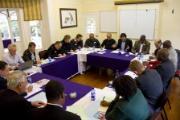
A number of leading South African academics, social commentators and political analysts will converge at Rhodes University on 11 and 12 November 2011 to participate in the South African Humanities Deans’ Association (SAHDA) Colloquium on ‘The Humanities and Popular Struggles in South Africa’.
Funded by the Harold Wolpe Memorial Trust, the Colloquium will reflect on the role of Humanities scholars in the broader society.
According to Professor Fred Hendricks, Dean of Humanities at Rhodes, the timing of the Colloquium is related to two recent publications: the Academy of Science for South Africa’s (ASSAf) “Consensus Study on the State of Humanities in South Africa: Status, prospects and strategies” and the Charter for Humanities and Social Science regarding the upsurge in interest in the role of the Humanities.
“I’ve had a sense about the disjuncture between what happens in academic discipline and broader society. There is a huge chasm between what is happening in popular struggles and politics in broader societies, and the Humanities on the other hand,” he said.
In an attempt to invigorate debate around the role of the Humanities, Prof Hendricks said the Colloquium will encourage thought on how to reclaim the space the Humanities filled in the 1970's and 1980's without replicating the many mistakes made then.
“In attempting to influence thinking and contribute to social change in the current period, we need to be more reflective of our roles as scholars in relation to the broader society,” said Prof Hendricks.
Emphasising the dramatic changes that have occurred within South African society since 1994 and how Humanities disciplines have been affected by and contributed to them, Prof Hendricks said these, coupled with global changes have had significant impacts on the role of the academic.
Mounting pressures to meet performance targets by publishing in accredited journals, teaching very large classes and administering academic departments have decisively shifted the terrain away from a dialogue with popular struggles towards an instrumentalist professional agenda, he said.
“While there is some unevenness between various disciplines in the Humanities, it is safe to say that we have not navigated the post-apartheid terrain with quite the same confidence as we challenged apartheid. In the process, our connectedness with organisations of civil society has been severed.”
“There is clearly a need for us to think differently about our mission as university-based scholars in relation to the ongoing problems and struggles in our communities, not only to revive our own intellectual activity but also to make a sustained contribution to the public good,” he said.
Speakers including Dr Barney Pityana (former Unisa Vice-Chancellor), Dr Steven Friedman (Director of the Centre for the Study of Democracy, Rhodes University and University of Johannesburg), Professor Lungisile Ntsebeza (NRF Research Chair in Land Reform and Democracy in South Africa), Dr John Pampallis (special advisor to the Minister of Higher Education), Dr Sarah Mosoetsa (deputy director, Charter for the Humanities and Social Sciences) and Professor Rose Boswell (Head of Department of Anthropology and Deputy-Dean of Humanities, Rhodes University) will present on a range of topics including the intellectual in society, historiographies of struggle in South Africa, the Humanities and university inequality, future expectations/directions of the Humanities, reports on the Humanities in South Africa and the Humanities and contemporary popular politics.
South African Humanities Deans’ Association Colloquium Programme
By Sarah-Jane Bradfield
Photo by Sophie Smith

